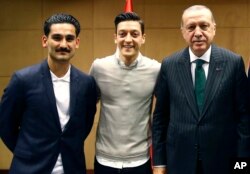German soccer star Mesut Ozil announced Sunday he would no longer be playing for his country's national soccer team.
In a letter posted on Twitter Sunday, the 29-year-old midfielder — who is Muslim and of Turkish heritage — cited racism from members of the German media and football organization as his primary reason for stepping down.
“It is with a heavy heart and after much consideration that because of recent events, I will no longer be playing for Germany at international level whilst I have this feeling of racism and disrespect,” Ozil, who was born and raised in the German city of Gelsenkirchen, wrote. “I am German when we win, but an immigrant when we lose.”
Ozil is widely regarded as one of the best midfielders in the world. In the 2014 FIFA World Cup, he started all seven of Germany's matches en route to his nation claiming its fourth World Cup title.
Yet in this year’s World Cup, Germany struggled and was knocked out of the tournament in the group stage. Ozil, who before the tournament had been photographed with Turkish President Recep Tayyip Erdogan — infamous for accusing the German government of carrying out “Nazi practices” in 2017 — often found himself as a scapegoat, the Arsenal star wrote.
“Why else did [some German newspapers] use pictures and headlines with my name as a direct explanation for defeat in Russia?” Ozil wrote. "They didn't criticize my performances. They didn't criticize the teams performances. They just criticized my Turkish ancestry and respect for my upbringing.”
Ozil, as well as fellow German national team midfielder Ilkay Gundogan — who is also of Turkish heritage and was pictured alongside Ozil and Erdogan — was booed while warming up for games in the recent World Cup, according to Al Jazeera.
Ozil also alleged he had been the victim of racial discrimination from the German Football Association, the organization in charge of the sport within the nation, including the national soccer team.
“People with racially discriminative backgrounds should not be allowed to work in the largest football federation in the world that has many players from dual-heritage families,” Ozil wrote. “Attitudes like theirs simply do not reflect the players they supposedly represent.”
In a statement, the German Football Association rejected Ozil’s claims, writing that while they were disappointed to hear of Ozil’s departure, they rejected any link of racism within the organization.
“It is regrettable that Mesut Ozil felt that he had not been sufficiently protected as a target of racist slogans,” the statement read. “The [German Football Association] stands for diversity.”
Immigration, particularly from majority-Muslim nations, has become a significant wedge issue in German politics in recent years. Since 2014, nearly 2 million from war-torn countries such as Syria have arrived in Germany.
Far-right political parties such as the immigration hard-liner Alternative for Germany have gained more of a footing in the country. Wiebke Muhsal, a politician in the party, tweeted on Sunday that Ozil took too long to quit.
Uli Hoeness, president of Bayern Munich, Germany’s most popular soccer team, told reporters he was “glad this nightmare was over,” claiming that Ozil has “been playing like [expletive] for years.”
A spokesperson for German Chancellor Angela Merkel said Ozil’s decision “must be respected.”
Turkish Justice Minister Abdulhamit Gül said Ozil had “scored the most beautiful goal against the virus of fascism” by leaving the national team.
Racism has long plagued soccer, long regarded as the world’s most popular sport. In March, the Russian football association was fined after fans directed racial abuse against members of the French national team during a friendly match.
“Footballers must always be wary of their status as role models being exploited for political propaganda, but no player should ever have their loyalty to their country questioned because of a dual heritage,” Kick it Out, an organization campaigning for football equality, said in a statement.





